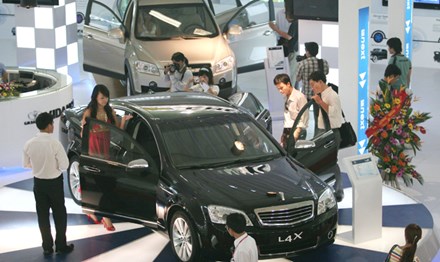Economists and representatives of Vietnamese automobile enterprises believe the threatened departure of foreign automobile manufacturers would not be a problem for Vietnam.

JETRO HCMC Branch said recently that Japanese automobile manufacturers are considering scaling down automobile production in Vietnam as the tax policies are not encouraging enough for them to maintain production.
The organization said Japanese investors plan to focus on making cars at their factories in Thailand and Indonesia to export products to Vietnam, which plans to cut the import tariff to zero percent from 2018.
According to Takimoto Koji, chief representative of JETRO HCMC Branch, the Vietnamese automobile market is too small with 250,000 products sold every year. The Thai market has 2 million products.
While the Vietnamese market is small, the competition here is very stiff. As one automobile manufacturer can sell 50,000 products a year at maximum, the profit is not attractive enough. In general, a manufacturer needs to make 200,000 products a year to make profit.
| Economists and representatives of Vietnamese automobile enterprises believe the threatened departure of foreign automobile manufacturers would not be a problem for Vietnam. |
Though JETRO’s representative later said that there is only ‘low possibility’ of Japanese automobile manufacturers leaving Vietnam or scaling down production here, the announcement about departure still has caught the attention of economists.
An economist said that in 2015, Toyota Vietnam once asked for preferential tax in exchange for its stay in Vietnam. Two years before that, a series of automobile manufacturers lodged complaints to the government, asking for policies to help them expand the production scale of some product lines.
Pham Chi Lan, a renowned economist, commented that the plan of increasing localization ratios in automobile products failed because of the policies applied since the very beginning.
“Vietnam wants ‘made in Vietnam products’, but it only does assembling. Meanwhile, automobile manufacturers have larger markets in other ASEAN countries,” she said.
“Vietnam also want to develop supporting industries for automobile manufacturing. However, it depends on foreign manufacturers,” she continued.
“Vietnam gives incentives based on enterprises’ commitments,” she said, adding that enterprises broke their promises.
Director of An Phuc Trading Nguyen Tuan, agreeing with Lan, said that if foreign invested enterprises want protection from the Vietnamese government, they have to transfer technology to Vietnam.
Regarding the development of supporting industries, president of Vinaxuki Bui Ngoc Huyen said the current policies don’t encourage enterprises to invest in the field.
He said to improve the localization ratio, Vietnam needs to apply drastic measures to protect local production, such as high taxes on car part imports. China, for example, imposes a high tax rate of 30-40 percent, twice as many as the rate in Vietnam.
Tran Thuy / vietnamnet